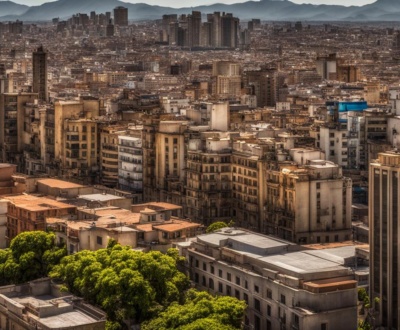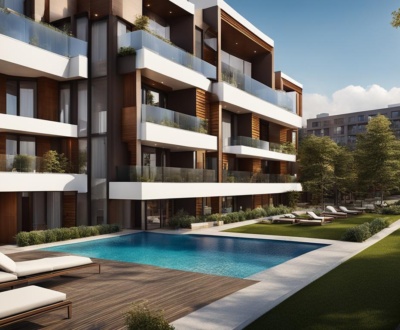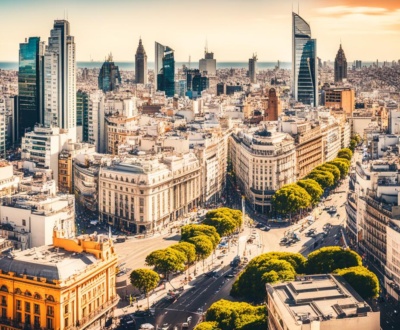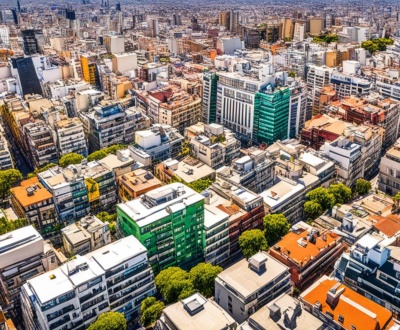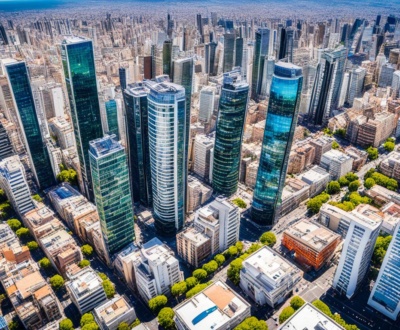Argentina Real Estate Investment Guide Essentials
- January 21, 2024
- Argentina Investments, Argentina Property, Argentina Real Estate
Welcome to our comprehensive Argentina Real Estate Investment Guide. If you’re a foreign buyer looking for lucrative real estate investment opportunities in Argentina, you’ve come to the right place. In this guide, we will provide you with all the essential information you need to navigate the property market in Argentina and make informed investment decisions. Whether you’re interested in investing in Argentine properties, exploring the property market trends, or discovering the best locations for real estate investment, this guide has got you covered.
Key Takeaways:
- Argentina offers diverse landscapes and attractive regions for real estate investment.
- Foreigners have the right to buy and own property in Argentina, but there are certain restrictions.
- Owning property in Argentina does not automatically grant residency or citizenship.
- The decision to rent or buy property in Argentina depends on individual circumstances.
- The property buying process in Argentina involves several steps and professional guidance is crucial.
Can Foreigners Buy Property in Argentina?
Foreign buyers have the opportunity to invest in the Argentine real estate market and own property in Argentina. According to the Argentine Constitution, foreigners have the right to buy and own property in the country. However, it is important to be aware of certain restrictions on land acquisition by foreigners, especially in rural areas and near water sources. These restrictions aim to protect Argentina’s national resources and safeguard the interests of local communities.
To ensure a smooth and compliant process, foreign buyers must fulfill certain requirements. Here are the key factors to consider when buying property in Argentina as a foreigner:
- Obtain a Tax ID (CDI): Foreign buyers need to obtain a Tax ID (Clave de Identificación, or CDI) from the Argentine tax authority (AFIP). This ID is mandatory for any real estate transaction and demonstrates the buyer’s commitment to fulfilling tax obligations.
- Local Community Benefits: Foreign buyers must demonstrate that their investment will benefit the local community. This can be in the form of job creation, infrastructure development, or other contributions that enhance the region’s economy and social welfare.
- Special Certificates and Permits: Depending on the property type and the buyer’s circumstances, special certificates and permits may be required. For example, if buying rural land, foreigners might need to obtain a Rural Land Ownership Certificate (Certificado de Dominio Rural, or CDR) to ensure compliance with local regulations.
- Consult Legal Professionals: Understand the property laws in Argentina and seek advice from legal professionals with expertise in real estate transactions. They can guide you through the process, review contracts, and ensure compliance with legal requirements.
By familiarizing themselves with the property laws and regulations in Argentina, foreign buyers can confidently navigate the buying process and invest in properties that align with their goals and contribute positively to the local communities.
Property Ownership in Argentina by Foreigners:
Foreigners have the same property ownership rights as Argentine citizens. They can own various types of properties, including residential homes, commercial spaces, and agricultural land. The ownership rights come with the responsibility to comply with the applicable laws and regulations governing property ownership in Argentina.
It is important to note that land acquisition by foreigners is subject to certain restrictions, primarily aimed at protecting natural resources and preserving the interests of local communities. These restrictions may vary depending on the location and type of property. Seeking professional advice and conducting thorough due diligence will help foreign buyers ensure compliance with the property laws in Argentina.
| Advantages | Disadvantages |
|---|---|
| Opportunity to invest in a diverse and growing real estate market | Restrictions on land acquisition in certain areas |
| Potential for long-term capital appreciation | Additional paperwork and requirements for foreign buyers |
| Ownership rights and benefits similar to Argentine citizens | Responsibility to comply with local laws and regulations |
| Diverse property options, including residential, commercial, and agricultural | Fluctuations in the economic and political climate |
Residency and Real Estate Investment in Argentina
Owning property in Argentina does not automatically grant residency or citizenship. However, foreign buyers can apply for temporary residence as investors by making a significant investment in Argentina and presenting a viable investment project. The Ministry of Production reviews the project’s economic and financial sustainability before granting temporary residency. This temporary residency can be renewed for up to three years. It is important to note that there is no specific residency program based solely on real estate investment in Argentina.
Investors looking to obtain residency in Argentina through property investment have an opportunity to establish a long-term presence in the country. By making a substantial investment, foreign buyers can apply for temporary residence, which allows them to stay in Argentina legally and enjoy the benefits of residency, such as accessing healthcare and education facilities.
To qualify for temporary residence as an investor, foreign buyers must meet certain requirements. These include:
- Investing a significant amount of capital in Argentina
- Presenting a viable investment project that contributes to the country’s economic growth
The investment project is carefully reviewed by the Ministry of Production to ensure its economic and financial sustainability. If approved, the investor is granted temporary residence, which is valid for up to three years. This period can be extended by renewing the temporary residence permit.
The process of obtaining temporary residence as an investor involves several steps:
- Make a substantial investment in Argentina
- Prepare a detailed and comprehensive investment project
- Submit the investment project to the Ministry of Production for evaluation
- Undergo a review process to assess the economic and financial viability of the investment
- If approved, obtain temporary residence as an investor
- Renew the temporary residence permit when necessary
It is important to note that temporary residence as an investor does not guarantee permanent residency or citizenship. However, it provides a pathway for foreign buyers to establish a legal presence in Argentina and enjoy the benefits of residency while engaging in investment activities.
Renting vs. Buying Property in Argentina
When it comes to making a decision between renting or buying property in Argentina, there are various factors to consider. Your individual circumstances and long-term plans play a significant role in determining the most suitable option for you.
If you plan to live in Argentina for an extended period or want to use the property frequently, buying can be a wise choice. It offers stability and the freedom to make the property your own. Additionally, if property prices are appreciating in the region, buying can be a valuable investment in the long run.
On the other hand, if you have other investment opportunities or do not plan to reside in Argentina permanently, renting may be a more suitable option. Renting provides flexibility, allowing you to explore different regions and properties without the commitment of ownership. It also eliminates the responsibilities and costs associated with property maintenance.
It’s important to consider the real estate market in Argentina when weighing the decision. Analyzing trends, property prices, and interest rates can provide insight into the potential returns and risks of buying or renting property.
Furthermore, property financing options in Argentina are limited compared to other countries. It may be challenging to secure favorable financing terms, especially for non-residents. If financing is a crucial factor for your decision-making process, thoroughly research and evaluate the available options.
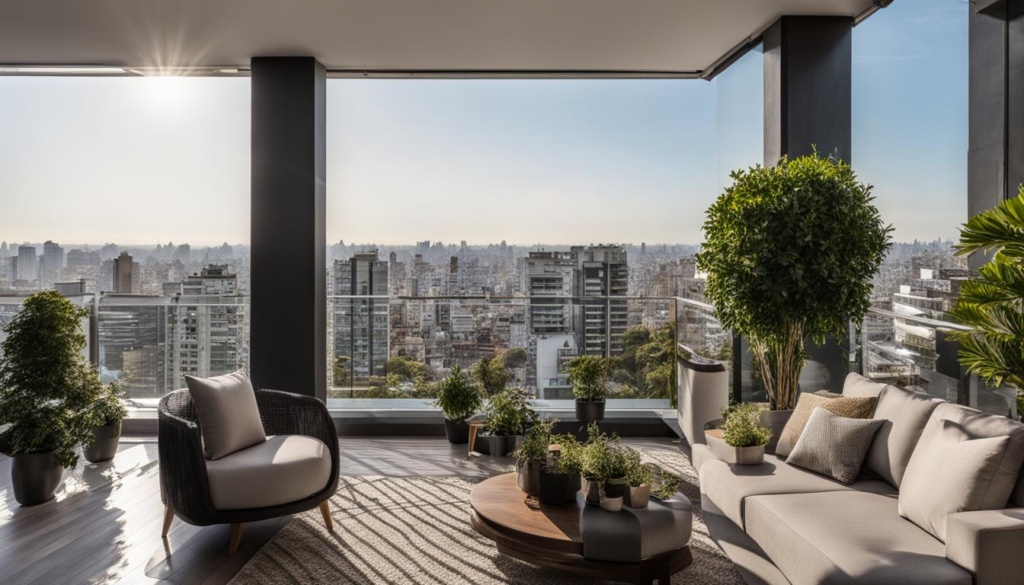
Pros and Cons of Renting Property in Argentina
- Pros of renting property in Argentina:
- Flexibility to explore different regions and properties without long-term commitment
- No responsibility for property maintenance and repairs
- Lower upfront costs compared to buying
- Cons of renting property in Argentina:
- Renting may be less cost-effective in the long run, depending on rental prices and property appreciation
- No opportunity for property investment returns
- Potential for rent increases and limited control over property modifications
Pros and Cons of Buying Property in Argentina
- Pros of buying property in Argentina:
- Long-term stability and the ability to make the property your own
- Potential for property appreciation and investment returns
- Opportunity to generate rental income if not using the property full-time
- Cons of buying property in Argentina:
- Higher upfront costs, including property purchase and maintenance expenses
- Responsibility for property management and repairs
- Potential risks associated with property market fluctuations
The Buying Process in Argentina
When purchasing a property in Argentina, it is essential to be familiar with the buying process to ensure a smooth and successful transaction. Here are the key steps involved:
- Find a reputable notary public (escribano): A notary public plays a crucial role in the property transaction by overseeing the legal processes and ensuring compliance with regulations. It is important to choose a reputable and experienced notary who is knowledgeable about the property laws in Argentina.
- Obtain a tax ID (Clave de Identificación): As a buyer, you will need to obtain a tax ID number called Clave de Identificación (CDI) to complete the property purchase process. This identification number is required for various transactions related to property ownership in Argentina.
- Find a real estate agent: Working with a reliable real estate agent who has extensive knowledge of the local market can be beneficial. They can assist you in finding suitable properties, negotiating deals, and guiding you through the buying process.
- Make an initial offer: Once you have found a property of interest, you can make an initial offer to the seller. This offer may include price negotiations and any conditions or contingencies you want to include in the purchase agreement.
- Sign a purchase agreement: After reaching an agreement with the seller, a purchase agreement (contrato de compraventa) is drawn up. This legally binding document outlines the terms and conditions of the sale, including the purchase price, payment schedule, and any contingencies.
- Conduct property inspections: It is advisable to hire a professional property inspector to evaluate the condition of the property before finalizing the transaction. This will help identify any potential issues or repairs that might need attention.
- Complete the title transfer and payment: Once all the necessary checks and inspections have been completed, the final step involves the transfer of title and making the payment. The agreed-upon payment method, whether it is cash or bank transfer, will be specified in the purchase agreement.
Throughout the buying process, it is crucial to work with professionals, such as notaries, real estate agents, and property inspectors, who can provide guidance and ensure compliance with legal requirements. Additionally, it is important to be aware of the fees and payments associated with buying property in Argentina, including notary fees, property transfer taxes, and any other applicable costs.
By following these steps and seeking professional advice, you can navigate the property purchasing process in Argentina with confidence and secure your investment.
The Real Estate Market in Argentina
The real estate market in Argentina is a dynamic and ever-changing landscape influenced by various economic, political, and regulatory factors. Understanding the trends and intricacies of this market is crucial for individuals looking to invest their hard-earned money in properties in Argentina.
Property prices in Argentina, especially in popular regions like Buenos Aires, Mendoza, and Cordoba, can vary significantly based on factors such as location, property type, and prevailing market trends. Buyers must stay updated on these trends and consult with local experts to make informed decisions.
Despite economic fluctuations, the Argentine real estate market has historically shown resilience and the potential for appreciation over time. With careful research and analysis, investors can identify promising investment opportunities with long-term growth prospects.
To gain a comprehensive understanding of the real estate market in Argentina, it is essential to stay informed about economic conditions, political changes, and local regulations. Consulting with local experts can provide valuable insights and guidance for making successful investment decisions.
Factors Influencing the Argentine Real Estate Market
- Economic conditions: The overall state of the Argentine economy, including inflation rates, GDP growth, and investment climate, can impact the real estate market.
- Political factors: Political stability, government policies, and changes in leadership can affect investor confidence in the real estate market.
- Local regulations: Property laws, tax policies, and zoning regulations can influence property prices and investment potential in different regions of Argentina.
Market Trends and Investment Potential
Investors should pay close attention to market trends and conduct thorough research to identify areas with high investment potential. Some regions in Argentina have demonstrated sustained growth and demand, making them attractive options for real estate investment.
Additionally, emerging trends such as sustainable and eco-friendly housing, urbanization projects, and tourism development can create new investment opportunities in Argentina’s real estate market.
Consulting Local Experts
When considering real estate investment in Argentina, it is crucial to consult with local experts who have in-depth knowledge of the market and current trends. They can provide valuable advice regarding property prices, emerging neighborhoods, investment strategies, and legal considerations.
Seeking assistance from reputable real estate agents, lawyers, and property consultants can help streamline the investment process and ensure compliance with local regulations.
Property Types and Prices in Argentina
When it comes to investing in real estate in Argentina, there is a wide variety of property types to choose from. Whether you’re looking for a residential home, an apartment, a commercial space, or even agricultural land, the Argentine property market has options to suit every investor’s preferences and goals.
Property prices in Argentina can vary based on several factors, including the location, property type, and current market conditions. Generally, properties in larger cities like Buenos Aires tend to have higher price tags compared to properties in smaller cities or less developed areas.
For those looking to invest in residential properties in Argentina, there are plenty of options available. From cozy apartments in the bustling city centers to spacious houses in tranquil suburban neighborhoods, the residential real estate market offers a range of choices to consider.
If you’re interested in commercial properties, Argentina also presents numerous opportunities. With a thriving business landscape and a growing economy, investing in commercial spaces such as offices, retail spaces, or industrial buildings can be a lucrative decision.
Additionally, agricultural land is another category of properties in Argentina that attracts investors. The country’s fertile soil and diverse landscapes make it an ideal location for agricultural activities such as farming or vineyard cultivation, offering the potential for high yields and long-term growth.
Property Prices in Argentina
As mentioned earlier, property prices in Argentina can vary significantly depending on various factors. Here’s a broad overview:
| Property Type | Price Range (Approximate) |
|---|---|
| Residential Homes | $100,000 – $1,000,000+ |
| Apartments | $50,000 – $500,000+ |
| Commercial Spaces | $100,000 – $5,000,000+ |
| Agricultural Land | $1,000 – $10,000+ per hectare |
Note: These price ranges are approximate and can vary greatly depending on specific locations, property sizes, and other market factors.
Property Yields in Argentina
Investing in properties in Argentina can provide attractive yields, particularly in cities with a strong rental market. Residential properties, especially in sought-after areas, can generate steady rental income and offer the potential for capital appreciation over time.
Commercial properties, on the other hand, can provide higher yields depending on the type of property and its location. Prime commercial spaces in central business districts or popular retail areas tend to have higher rental demand and potential for income growth.
Investors interested in agricultural land can benefit from the potential for high yields through agricultural activities like crop cultivation or livestock production. Argentina’s favorable climate and fertile lands make it an attractive destination for agricultural investments.
It is important to conduct thorough research and consult with local experts who have a deep understanding of the specific property types and price ranges in Argentina. Expert guidance can help you make informed decisions and maximize the potential returns on your real estate investment.
Best Locations for Real Estate Investment in Argentina
Argentina offers diverse landscapes and attractive regions for real estate investment. Whether you’re seeking bustling urban life, stunning natural beauty, renowned wine production, or a blend of colonial and modern architecture, Argentina has something to offer. Consider market trends, tourism potential, and infrastructure development when choosing the best location for your real estate investment in Argentina.
Buenos Aires
Buenos Aires, the capital and largest city of Argentina, is a vibrant metropolis with a rich cultural heritage. It is known for its historic neighborhoods, such as San Telmo and Palermo, where you can find beautifully preserved architecture and a thriving arts scene.
Patagonia
Located in the southern region of Argentina, Patagonia is renowned for its awe-inspiring natural scenery. From snow-capped mountains to breathtaking glaciers, this region offers stunning landscapes that attract adventure enthusiasts and nature lovers alike.
Mendoza
Mendoza, in the foothills of the Andes Mountains, is Argentina’s premier wine-producing region. With its vineyards, olive groves, and charming wineries, Mendoza offers the perfect blend of natural beauty and gastronomic delights.
Cordoba
Cordoba, Argentina’s second-largest city, is a treasure trove of colonial and modern architecture. Its picturesque buildings, cobblestone streets, and vibrant nightlife make it a popular destination for tourists and real estate investors alike.
To help you visualize the investment potential in these locations, here’s a table showcasing property prices in each region:
| Location | Property Prices |
|---|---|
| Buenos Aires | $$ |
| Patagonia | $$$ |
| Mendoza | $$ |
| Cordoba | $$ |
Investing in real estate in Argentina allows you to explore diverse landscapes and tap into the potential of popular regions. Whether you’re looking for vibrant city life, natural wonders, or cultural experiences, Argentina has something for everyone. Consider your priorities, conduct thorough research, and seek professional advice to make the most informed investment decisions.
Trends and Forecasts for the Real Estate Market in Argentina
The real estate market in Argentina is influenced by various economic and political factors. These factors play a significant role in shaping the trends and forecasts for the property market in the country. Understanding these dynamics is essential for making informed investment decisions.
Economic Factors Impacting the Property Market in Argentina
The economic conditions in Argentina, such as inflation and foreign investment climate, have a direct impact on the real estate market. Inflation rates can affect property prices and investment returns. It is important for investors to keep a close eye on economic indicators and seek expert insights to anticipate potential market shifts.
Currency Stability in Argentina
Currency stability is another crucial factor that influences the real estate market in Argentina. Fluctuations in the value of the Argentine peso can impact property prices, particularly for foreign buyers. Monitoring the currency exchange rates and understanding the implications for real estate investments is vital for mitigating financial risks.
Political Changes in Argentina
Political changes, both at the national and local levels, can have a significant impact on the real estate market. Shifts in government policies and regulations can directly affect property ownership, taxes, and investment incentives. Staying informed about political developments and their potential implications is essential for making sound investment decisions.
Despite periods of economic volatility, the real estate market in Argentina has shown resilience and the potential for capital appreciation. Monitoring market trends, understanding economic factors, currency stability, and political changes are key to navigating the real estate market successfully.
Investing in real estate in Argentina offers opportunities for long-term growth and potential for attractive returns. However, it is crucial to stay informed, seek professional guidance, and conduct thorough research to make informed investment decisions in this dynamic market.
Common Pitfalls and Challenges in Real Estate Investment in Argentina
Investing in real estate in Argentina can be an exciting opportunity, but it is essential to be aware of the potential pitfalls and challenges that may arise. Understanding and mitigating these risks can help ensure a successful and secure investment. Some of the common challenges faced by foreign buyers in the Argentine property market include:
Legal Complexities
The legal regulations surrounding property ownership in Argentina can be complex, particularly for foreign buyers. It is crucial to work with reputable professionals, such as lawyers who specialize in real estate, to navigate the intricacies of the Argentine property market. These professionals can provide valuable guidance and ensure that all legal requirements are met.
Currency Exchange Risks
Argentina has experienced significant currency fluctuations in the past, which can pose exchange rate risks for foreign investors. Fluctuations in the exchange rate between the Argentine Peso (ARS) and other currencies can impact the value of real estate investments. It is crucial to factor in the potential currency risks and consult with financial experts to develop strategies to mitigate these risks.
Property Title Issues
Property title issues can be a potential challenge when buying real estate in Argentina. It is essential to conduct thorough due diligence to ensure that the property has a clear and marketable title. Working with experienced real estate agents and legal professionals can help identify any title issues and resolve them before completing the transaction.
Tax Implications
There are tax implications associated with real estate investment in Argentina. It is important to understand the tax laws and obligations in Argentina, both at the national and local levels. Consulting with tax experts can help ensure compliance with the tax regulations and optimize the investment’s financial outcomes.
By being aware of these challenges and working with reputable professionals, foreign investors can navigate the Argentine property market successfully. Thorough due diligence, market research, and professional guidance are key to mitigating risks and ensuring a secure and profitable real estate investment.

| Challenge | Description |
|---|---|
| Legal Complexities | The legal regulations surrounding property ownership in Argentina can be complex, particularly for foreign buyers. It is crucial to work with reputable professionals, such as lawyers who specialize in real estate, to navigate the intricacies of the Argentine property market. |
| Currency Exchange Risks | Argentina has experienced significant currency fluctuations in the past, which can pose exchange rate risks for foreign investors. It is crucial to factor in potential currency risks and consult with financial experts to develop strategies to mitigate these risks. |
| Property Title Issues | Property title issues can be a potential challenge when buying real estate in Argentina. It is essential to conduct thorough due diligence to ensure that the property has a clear and marketable title. Working with experienced real estate agents and legal professionals can help identify any title issues and resolve them before completing the transaction. |
| Tax Implications | There are tax implications associated with real estate investment in Argentina. It is important to understand the tax laws and obligations in Argentina, both at the national and local levels. Consulting with tax experts can help ensure compliance with the tax regulations and optimize the investment’s financial outcomes. |
Conclusion
Investing in real estate in Argentina can be a rewarding venture for foreign buyers. With its diverse landscapes, attractive locations, and potential for appreciation, Argentina offers numerous investment opportunities. However, to navigate the legal regulations and make informed decisions, it is essential to follow the Argentina Real Estate Investment Guide and conduct thorough research.
By understanding the property market trends, consulting local experts, and seeking professional advice, foreign investors can maximize their chances of success in Argentina’s real estate market. Taking into account factors such as location, property type, and market conditions, investors can identify the best opportunities for long-term growth and capitalize on the potential for capital appreciation.
Remember, investing in real estate requires due diligence and careful consideration. By leveraging the insights and strategies provided in this guide, foreign buyers can embark on a profitable real estate journey in Argentina. Whether you’re looking to build a rental portfolio, establish a permanent residence, or diversify your investment portfolio, Argentina’s real estate market has the potential to fulfill your aspirations.
FAQ
Can foreigners buy property in Argentina?
Yes, foreigners have the right to buy and own property in Argentina. However, there are certain restrictions on land acquisition by foreigners, particularly in rural areas and near water sources. It is important to understand the legal regulations and seek professional advice to navigate the process smoothly.
How can I obtain residency through property investment in Argentina?
Owning property in Argentina does not automatically grant residency. However, foreign buyers can apply for temporary residency as investors by making a significant investment in Argentina and presenting a viable investment project. It is important to consult with the Ministry of Production and fulfill the requirements for temporary residency.
Should I rent or buy property in Argentina?
The decision to rent or buy property in Argentina depends on individual circumstances. If you plan to live in Argentina long-term or use the property for extended periods, buying can be a wise choice. However, if you have other investment opportunities or do not plan to use the property frequently, renting may be a more suitable option.
What is the buying process for property in Argentina?
The property buying process in Argentina involves steps such as finding a notary public, obtaining a tax ID, finding a real estate agent, making an offer, signing a purchase agreement, conducting inspections, and completing the title transfer and payment. It is crucial to work with professionals and understand the associated fees and timeline of each step.
What is the real estate market like in Argentina?
The real estate market in Argentina can be influenced by economic conditions, political factors, and local regulations. Property prices in Buenos Aires and other regions can vary widely, with factors such as location, property type, and market trends affecting the prices. It is important to stay updated on the market trends and consult local experts for a thorough analysis.
What types of properties are available in Argentina and at what prices?
The property market in Argentina offers a range of options, including residential homes, apartments, commercial spaces, and agricultural land. Prices vary based on factors such as location, property type, and market conditions. It is advisable to conduct thorough research and consult local experts for specific property types and price ranges.
Where are the best locations for real estate investment in Argentina?
Argentina offers diverse landscapes and attractive regions for real estate investment. Popular locations include Buenos Aires, Patagonia, Mendoza, and Cordoba. Each region has its unique appeal and investment opportunities. It is essential to consider factors such as market trends, tourism potential, and infrastructure development when choosing a location for real estate investment in Argentina.
What are the current trends and forecasts for the real estate market in Argentina?
The real estate market in Argentina is influenced by various economic and political factors. Inflation, foreign investment climate, currency stability, and political changes can impact the property market. It is important to monitor market trends and stay informed about economic and political developments when considering real estate investment in Argentina.
What are the common challenges and pitfalls in real estate investment in Argentina?
Investing in real estate in Argentina can come with challenges such as legal complexities, currency exchange risks, property title issues, and tax implications. It is crucial to work with reputable professionals to navigate these complexities and mitigate risks. Thorough due diligence, market research, and professional guidance are essential for a successful and secure real estate investment in Argentina.
Is investing in real estate in Argentina a rewarding venture for foreigners?
Yes, investing in real estate in Argentina can be a rewarding venture for foreign buyers. With its diverse landscapes, attractive locations, and potential for appreciation, Argentina offers numerous investment opportunities. However, it is important to navigate the legal regulations, understand the property market trends, and seek professional advice to make informed investment decisions.
More from our blog
See all postsRecent Posts
- Argentina Property Management: Expert Care & Services February 2, 2024
- Understanding Argentina Real Estate Law Essentials February 2, 2024
- Argentina Luxury Apartments: Upscale Living February 1, 2024



